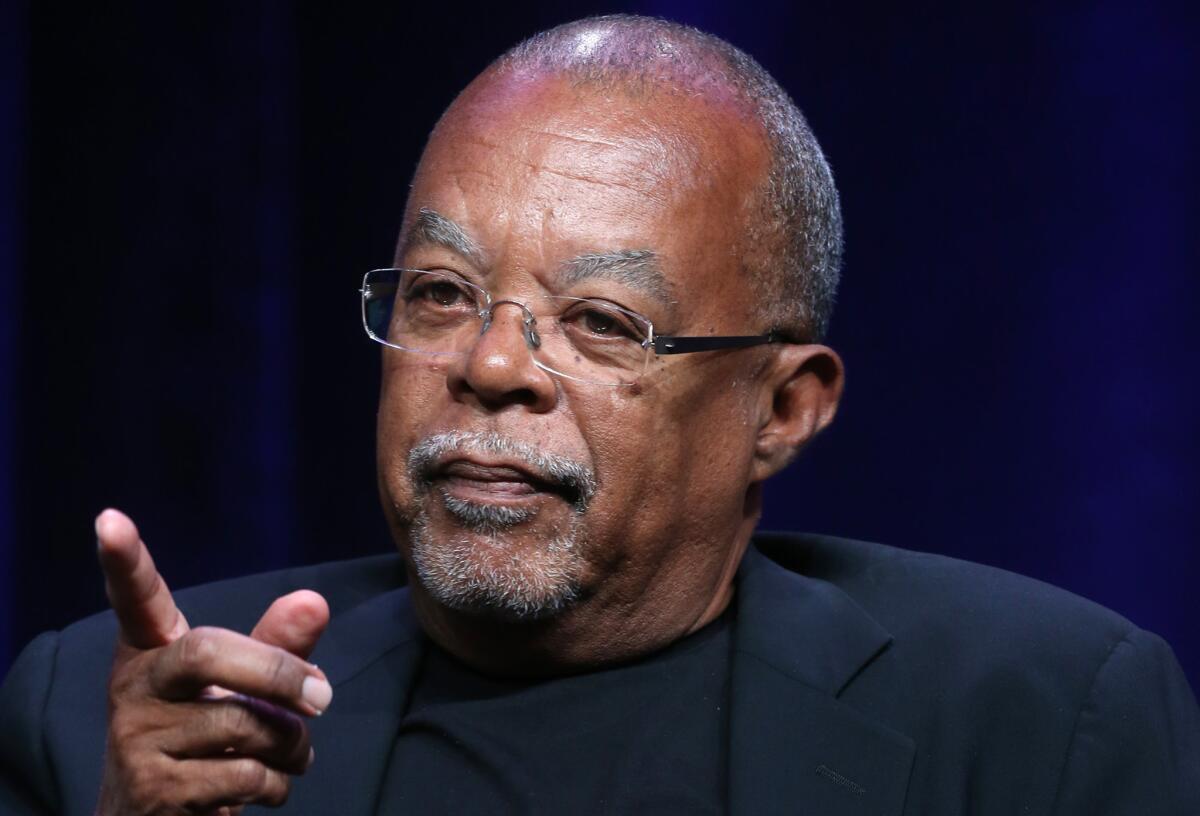For Henry Louis Gates Jr., a lifelong interest in family history in ‘Finding Your Roots’

- Share via
Those who develop a strong interest in their forebears tend to do so later in life. But that was not the way for Henry Louis Gates Jr. The Ivy League professor, whose fascinating genealogical show “Finding Your Roots With Henry Louis Gates, Jr.” is now in its second season on PBS, remembers the precise date when his ancestral curiosity was roused. It was July 3, 1960, and he was 9 years old.
That was the day of his grandfather’s funeral. After the service, Gates’ father brought him and his older brother to his grandparents’ home in Cumberland, Md. For the first time, the children were allowed upstairs. On a sun porch off the bedroom stood a large armoire filled with bank ledgers that were jammed not with financial accounts but something that was of perhaps greater value — family history.
------------
For the record: An article in the Oct. 19 Calendar section about the PBS genealogy show “Finding Your Roots” misspelled the first name of writer-actress Tina Fey as Tiny.
------------
After a lengthy search through many carefully curated volumes of newspaper clippings and photos, his father singled out an article dated Jan. 6, 1888. It was an obituary about Jane Gates, “an estimable colored woman,” according to the article, who was a former slave and the oldest traceable member of the Gates family line. Pointing to a separate sepia photograph, which now hangs in Gates’ Massachusetts home, his father instructed his boys to never forget her name or face.
“The last thing I did that night was to look up the word ‘estimable’ in my red Webster’s dictionary,” said Gates, director of the Hutchins Center for African & African American Research at Harvard. “I thought if that lady was estimable, maybe I’m estimable too.”
The next day, Gates began doing what he’s really been doing in one form or another for most of his professional life: piecing together history and culture. The answers he sought from his parents about his family tree aren’t much different from the ones he now searches for with his enviable list of high-profile guests on his show, which airs Tuesday nights through Nov. 25.
“Finding Your Roots” puts considerably more resources at his disposal than when he was just an inquisitive youngster from Piedmont, W.Va., armed with little more than a fresh composition book. Gates, a scholar who gained a national reputation in the 1990s for his efforts to diversify the literary canon, now deploys a cadre of genealogists and scientists to unearth long-forgotten or hidden pasts. The latest innovations in DNA testing enable researchers to accurately trace ancestry back more than 500 years and to identify geographical regions of origin such as Africa, Asia and Europe.
Typically, each of the program’s 10 hourlong episodes is built around a trio of guests whose family backgrounds dovetail, often in a thematic way that highlights a significant period in American history. Recent episodes focused on storytellers and athletes, for example. The series has performed respectably for PBS; in its first season, which aired in 2012, it averaged 2.5 million viewers per episode on all viewing platforms.
“I love genealogists, and they make what I do possible, but those records can be as dry as dust,” Gates said during a recent interview. “There is no narrative in documents. What we do is go through those documents and tell a story.”
The show has no shortage of riveting stories that often delve into deeply painful national subjects that might not be discussed at all if not for the innocuous framework of genealogy. In an earlier episode this season, New York Yankees star Derek Jeter was handed a paper from Gates that showed he is a blood relative of an Alabama slave owner who also gave him his last name.
“He just stares at that document,” said Gates.
The two men briefly speculate on the nature of the union that produced his great-great-grandfather Green Jeter, who was born into slavery and who after the Civil War founded a church on his father’s and former slave master’s land. Gates tells Jeter that rape and coerced sex were common. The all-star shortstop replies that he hoped the obviously problematic relationship was “as good as it could be.”
Meanwhile, CNN anchor Anderson Cooper and documentarian Ken Burns both found out in another episode this season that in the 19th century, their family lines contained slaveholders. Gates further tells Cooper that his slave-owning relative looks like he was beaten to death with a hoe by a slave.
“Do you think he deserved it?” asked Gates.
“Yeah, I do,” replied Cooper. “I feel a sense of shame over it.”
It wasn’t much easier for Burns — famous for his patriotic documentary films about the Civil War, national parks and, most recently, the Roosevelts — to accept his Confederate past.
“I don’t feel guilt,” said Burns, who was later informed that he was related to Abraham Lincoln. “But at the same time, there is a kind of sadness. I now have a personal connection to this thing I find so repugnant and so un-American and yet such a peculiarly American institution.”
Gates realizes that these are sensitive, even volatile, subjects. During the interviews, he says he’s attuned to what his subjects are feeling. “I know Ken was horrified to have a Confederate ancestor, and I go, ‘Aw, man, it’s OK,’” said Gates, whose 2013 historical series “The African Americans: Many Rivers to Cross” recently won an Emmy. “Here I am a black man comforting white people about having a Confederate ancestor.
“We’re not judging anyone. There were a lot of people that owned slaves. There were black people that owned slaves. And most of the people who didn’t own slaves didn’t own them not for any moral reasons but because they couldn’t afford them.”
Race is hardly the only potentially uncomfortable topic. Thanks to DNA results and robust investigative work, all kinds of family secrets are revealed. Tennis great Billie Jean King discovered on the show that her grandmother was born out of wedlock, while basketball star Rebecca Lobo found out that she had a Jewish great-grandfather she did not know about.
Many of the revelations from the past are great sources of pride. Playwright and actress Anna Deavere Smith was moved to tears learning about her great-great-grandfather Basil Biggs.
Biggs, a free black man and veterinarian, moved just outside Gettysburg, Pa., before the Civil War broke out, only to be forced to flee before the invading Confederate army. After the bloodiest battle on American soil, Biggs helped disinter the Union dead and lay proper graves that would later become Gettysburg National Cemetery. He was also a conductor on the Underground Railroad who helped slaves to freedom.
Gates’ current series grew out of another genealogical series, “African American Lives,” which premiered in 2006. Long inspired by Alex Haley’s book “Roots,” Gates coupled his zeal for the past with new developments in DNA testing to provide the ancestors of slaves a more complete picture of their heritage. The series ran for two seasons and included guests such as Oprah Winfrey, Maya Angelou and Chris Rock.
It was a letter that prompted Gates to diversify his show’s roster and eventually led to “Finding Your Roots.” “I received this letter from a lady of Russian Jewish descent, and she said, ‘Dr. Gates, are you a racist? I love your series, but you only do black people,” said Gates.
Upcoming episodes highlight a host of ethnic and cultural groups including one about Greek Americans (Tiny Fey, George Stephanopoulos and David Sedaris) and Jewish Americans (Tony Kushner, Carole King and Alan Dershowitz).
Intrigued by genealogy, Americans generally see the pursuit as a niche hobby, which has gained some additional popularity in recent years thanks to websites that help sort through an ocean of primary documents. Still, Americans tend not to be as enthusiastic about it as more mature cultures, seeming to heed the advice of pitcher Satchel Paige, who recommended not looking back, as “something might be gaining on you.”
“We are a nation of second acts and self-invention,” said Gates. “Look at the Jews. What do they want to remember about Europe? And the Irish? The English were torturing and starving them to death. And then you had poor people all over Europe who had absolutely no chance of owning property. The first place where virtually everyone could own property was the United States. So all these people were coming here to forget the hell that they were fleeing from, whether it was religious, political or economic.”
Ancestors are a paradox: They are you, and they are not. “You are walking with all the DNA of your ancestors for 500 years in your genome, so you’re a walking extension of them,” said Gates. “They are not talking to you, but they are walking with you.”
More to Read
The complete guide to home viewing
Get Screen Gab for everything about the TV shows and streaming movies everyone’s talking about.
You may occasionally receive promotional content from the Los Angeles Times.






